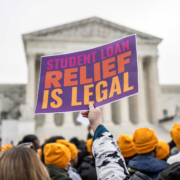
By Eden Iscil, Public Policy Manager
A few weeks ago, the US Supreme Court ignored the facts of the case in front of them and wrongfully ruled that President Biden’s first attempt at cancelling student debt was illegal. While the Court was misguided and seemingly hellbent on making life worse for millions of Americans, debt cancellation is not dead. Earning much less media coverage than the Court’s ruling, President Biden announced on that same day that his Department of Education had initiated a *plan B for debt cancellation. Additionally, he revealed a 12-month “on-ramp” to repayment. Here’s what we know so far about these two programs.
Plan B for cancelling student debt
Over the past 60 years, Congress passed two laws giving the secretary of education the authority to cancel student debts—the Supreme Court’s ruling last month only applied to one of them. While there is still one more legal avenue available for the Education Department to broadly cancel student debt, the law requires a lengthy regulatory process to get there. Specifically, the department must initiate a negotiated rulemaking, seeking input from various stakeholders involved in student debt. From nominating and appointing negotiators to reaching a final recommendation for the Department, this stage will likely finish around the end of the year.
Next, the Department will have to publish a proposed rule outlining the parameters of the debt cancellation plan. Currently, the administration has not spoken to how much debt will be cancelled under plan B and who will be eligible beyond an intention to deliver “debt relief for as many borrowers as possible.” This means that we shouldn’t expect to see the details of plan B until early 2024. And once the Department publishes its proposal, there will be a 60-90 day comment period for the public to submit their thoughts on the plan. Only after this comment period is finished (and the Department has read the public’s thoughts) can the program go into effect. Once all of these steps are completed, it will likely be around springtime next year at the very earliest.
A 12-month “on ramp” to repayment
Congress set September 30 as the last day of the federal loan payment pause. Without some form of debt cancellation, it is estimated that repayment will put over 9 million borrowers into default. Recognizing this reality and its legal inability to extend the current payment pause thanks to Congress, the Department will waive certain repayment related penalties from October 1, 2023 through September 30, 2024.
Specifically, during this year-long period, missing a monthly federal loan payment:
- Will not result in default or delinquency
- Will not be reported to credit bureaus
- And will not be referred to debt collection agencies
While both plan B and the 12-month on ramp are imperfect, the Department is taking steps to minimize harm and is still working to deliver debt relief. It’s important that we continue to show our support for debt cancellation, especially during the public comment period. We should not tolerate an educational system that results in lifelong debt and average monthly payments of $500.
*Links are no longer active as the original sources have removed the content, sometimes due to federal website changes or restructurings

















